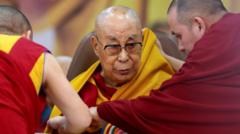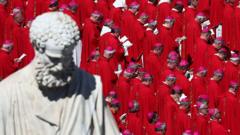With his 90th birthday approaching, the Dalai Lama is set to unveil a succession plan that potentially alters traditional practices, aiming to counteract Chinese influence over Tibetan Buddhism and safeguard the future of the exiled Tibetan community.
The Future of Tibetan Buddhism: Dalai Lama's Unique Succession Strategy

The Future of Tibetan Buddhism: Dalai Lama's Unique Succession Strategy
At 90, the Dalai Lama hints at a revolutionary plan for his successor to outmaneuver Chinese interference in Tibetan Buddhism.
The Dalai Lama, as he reaches the milestone of 90, is redirecting focus toward the succession of his role within Tibetan Buddhism and the broader exiled Tibetan community. The revered spiritual leader, who facilitated the migration of a large contingent of Tibetans from their homeland to escape persecution under Chinese rule nearly seventy years ago, is anticipated to announce a strategy regarding his successor that deviates from longstanding methods. This move seems aimed at preventing the Chinese government from establishing control and filling any resultant power void in Tibetan Buddhism.
The next Dalai Lama's selection has become a topic of deep concern as the current leader contemplates the future. Tenzin Gyatso, the 14th Dalai Lama, was born into a farming family in Tibet in 1935 and was recognized as the reincarnation of the 13th Dalai Lama at just two years of age. He rapidly ascended to spiritual authority and assumed political leadership at 16 during a pivotal time in Tibetan history marked by Chinese military invasion. Following the 1959 Tibetan uprising, the Dalai Lama escaped to India, where he now leads the Tibetan administration in exile.
The upcoming announcement regarding succession is poised to stir both hope and tension, as it quests to defy the anticipated measures by the Chinese administration, which may seek to exert its control over the future selection of the Dalai Lama.
The next Dalai Lama's selection has become a topic of deep concern as the current leader contemplates the future. Tenzin Gyatso, the 14th Dalai Lama, was born into a farming family in Tibet in 1935 and was recognized as the reincarnation of the 13th Dalai Lama at just two years of age. He rapidly ascended to spiritual authority and assumed political leadership at 16 during a pivotal time in Tibetan history marked by Chinese military invasion. Following the 1959 Tibetan uprising, the Dalai Lama escaped to India, where he now leads the Tibetan administration in exile.
The upcoming announcement regarding succession is poised to stir both hope and tension, as it quests to defy the anticipated measures by the Chinese administration, which may seek to exert its control over the future selection of the Dalai Lama.






















